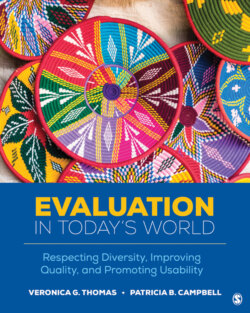Читать книгу Evaluation in Today’s World - Veronica G. Thomas - Страница 24
На сайте Литреса книга снята с продажи.
Capture Musings & Learning Questions
Оглавление“I wonder if …”
“I bet if we …”
“If I knew __________, I could _________.” (IllumiLab, 2018b, “Asking Questions”)
Read the following text about money.
oney can mean so many things to so many people. In evaluation, money can be an outcome, a confounding variable, or even a risk factor. Money is tied to access to resources and power. It is a key component that needs to be considered in evaluations.
Money as defined as annual family income, along with adult educational attainment are the conventional measures of socioeconomic status (SES) or class, although they are not the only ones. Indeed there is no consensus definition of class….
Making assumptions about income based on race, ethnicity or family education is dangerous and should be avoided. While there is a correlation between income and race and ethnicity, as well as between income and educational level in the United States, lower income and higher income families come in all colors and from all educational levels. Race, ethnicity and educational level are not proxy indicators of income or SES and should not be used as such. Indeed, evaluators should consider in their analysis disaggregating by race, ethnicity and educational level to tease out interactions.
Asking about income can be sensitive. Many people don’t feel comfortable discussing their income and often students don’t know their family income. Many evaluators use ranges the participant can choose such as $0–$25,000 or $25,001–$50,000 rather than asking for exact or even approximate numbers.
When working with lower income participants, particularly if they are in programs that provide them with financial support, evaluators should be sensitive to participant fears that if they don’t participate in the evaluation or if they raise concerns, that could impact their continued support from the program. This could impact whether their participation in the evaluation is truly voluntary and if their responses are free from pressure. (Campbell & Jolly, n.d.ah, paras. 1–5)
Now, organize in small groups and apply evaluative thinking by asking some of the preceding questions about the text you just read. Discuss your answers with others.
Courtesy of Campbell-Kibler Associates. Inc.
